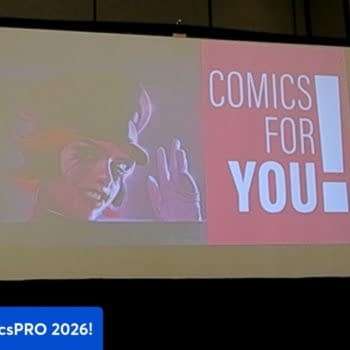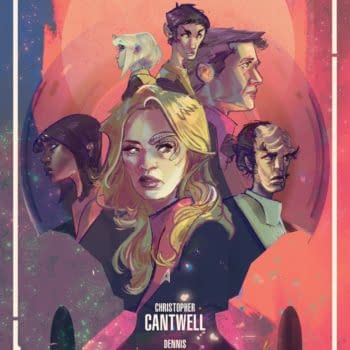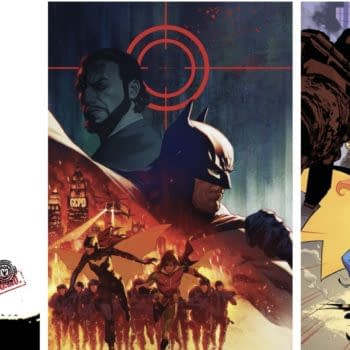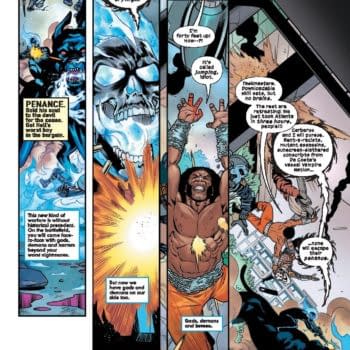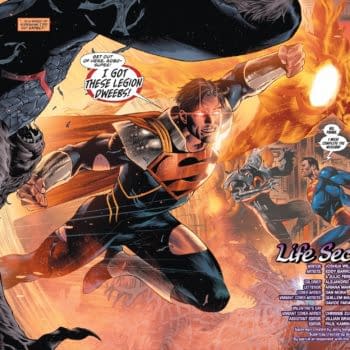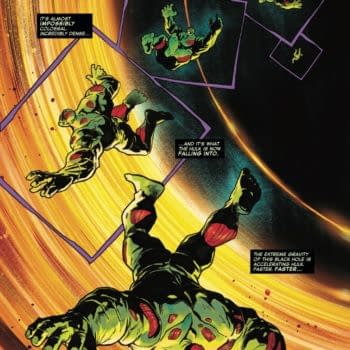Posted in: Comics | Tagged: Comics, gary friedrich, marvel
On The Lone Ranger, Adam West and Gary Friedrich by Tony Panaccio

Tony Panaccio writes for Bleeding Cool;
The Difference Between Legal Obligations and Moral Ones
It would be so easy to characterize the recent court decision against Gary Friedrich as another comic book David vs. Goliath story, but it really is so much more than that.
At the core of this issue is a real compressed conflict over intellectual property rights. On the one hand, artists who have good contracts with publishers and film studios want them to enforce intellectual property rights so that they can get paid from the distribution of their works. Musicians who post their music on iTunes don't like piracy any more than the corporate attorneys at Disney or Warners.
The bottom line is that piracy and plagiarism costs companies AND creative artists money. SO — from 10,000 feet above sea level, on a purely legal level, it's a good thing when intellectual property owners win these kinds of cases. However, the distinction has to be made between the legal obligation and the moral and ethical obligations of IP owners.
Did Wrather, who owned the IP rights for the Lone Ranger and had a new Lone Ranger movie coming out in the late 70s, have the right and the responsibility to protect their copyright by telling Clayton Moore to stop wearing the Lone Ranger mask at conventions? Yes. Could they have won the case, and then put Clayton Moore under contract to do PR for them wearing his old costume and mask? Absolutely, and it would have been a win-win. They would have fulfilled both their legal and their ethical (not to mention their public relations) obligations.
A similar mistake was made by Warners when they prevented Adam West from making personal appearances as Batman when the Tim Burton film was released in 1989. The studio's argument was that they didn't want to cause confusion among consumers with regard to the media representation of the character. The underlying current of that argument was that consumers are generally too stupid to tell the difference. Honestly, I could go either way on that. I live in a country where more people can name the winner of American Idol than the vice president of their country. Would some people have been confused and thought Adam West was starring in the new Batman movie? Maybe. Would they still have gone to see it? Probably — so what's the studio's problem? They still would have made money.
And that's what the studio failed to mention — that Adam's appearances as Batman at conventions around the country helped keep the Batman TV show in syndication, which generated a lot of ancillary revenue and popularity around the character, making the idea of a Batman movie more viable in the consumer marketplace.
Legally, they needed to win the case. Ethically and on a PR level, they could have won a great ambassador for their movie venture had they put him under contract and maybe even gave him a cameo in the film. They screwed that pooch just the same as Wrather.
Which brings us to Gary Friedrich's situation. This is a case of the same malaise that infected Wrather and Warners, and in both cases, they were less successful than they could have been had they simply taken their legal victory and then caved on the moral question (Many still blame the bad PR for why the Lone Ranger movie tanked. It could also have been that the movie stunk).
The problem in ALL THREE cases is that all these corporations are making a massive mistake — they are allowing their attorneys to dictate their public relations and marketing policy. By allowing the attorneys to be the only people to weigh in on this situation, they are exposing the marketing and PR arm of the studio to a ton of negative discourse.
The irony is that the marketing guys will put a lot of effort into marketing to comics fans, because they know that the fans can help deliver a solid opening weekend. On the flip side of that, however, the corporate team doesn't feel the comic fans are a large enough block to cause a movie to tank completely. And while that seems incongruous, it's reasonably close to the truth.
Ghost Rider, despite all the recent efforts to the contrary, will still likely do well enough at the box office (if it's a decent film) even if every single comic fan stays home on opening weekend. Does that mean this is a lost cause for Gary? Not in the least. A strong outpouring from the fans have saved shows from cancellation in the past. Fans DO have power. It's just a matter of whether the fan outcry will garner major mainstream media attention.
On that note, let me close with this. Remember when Stan Lee sued Marvel for his share of the Spider-Man movie profits? Marvel settled for the full $10 million only a few days after a 60 Minutes profile of Stan that painted him as the victim of Marvel's and Sony's corporate greed. My point? If you want to help Gary, you'll have to get the mainstream media involved. If you can get a few pieces about the controversy on Huffington Post, MSN, CNN and a few other big media outlets, you just might get the Mouse's attention.
Tony Panaccio is the former Senior VP of CrossGen Entertainment and currently a media consultant in the U.S.








